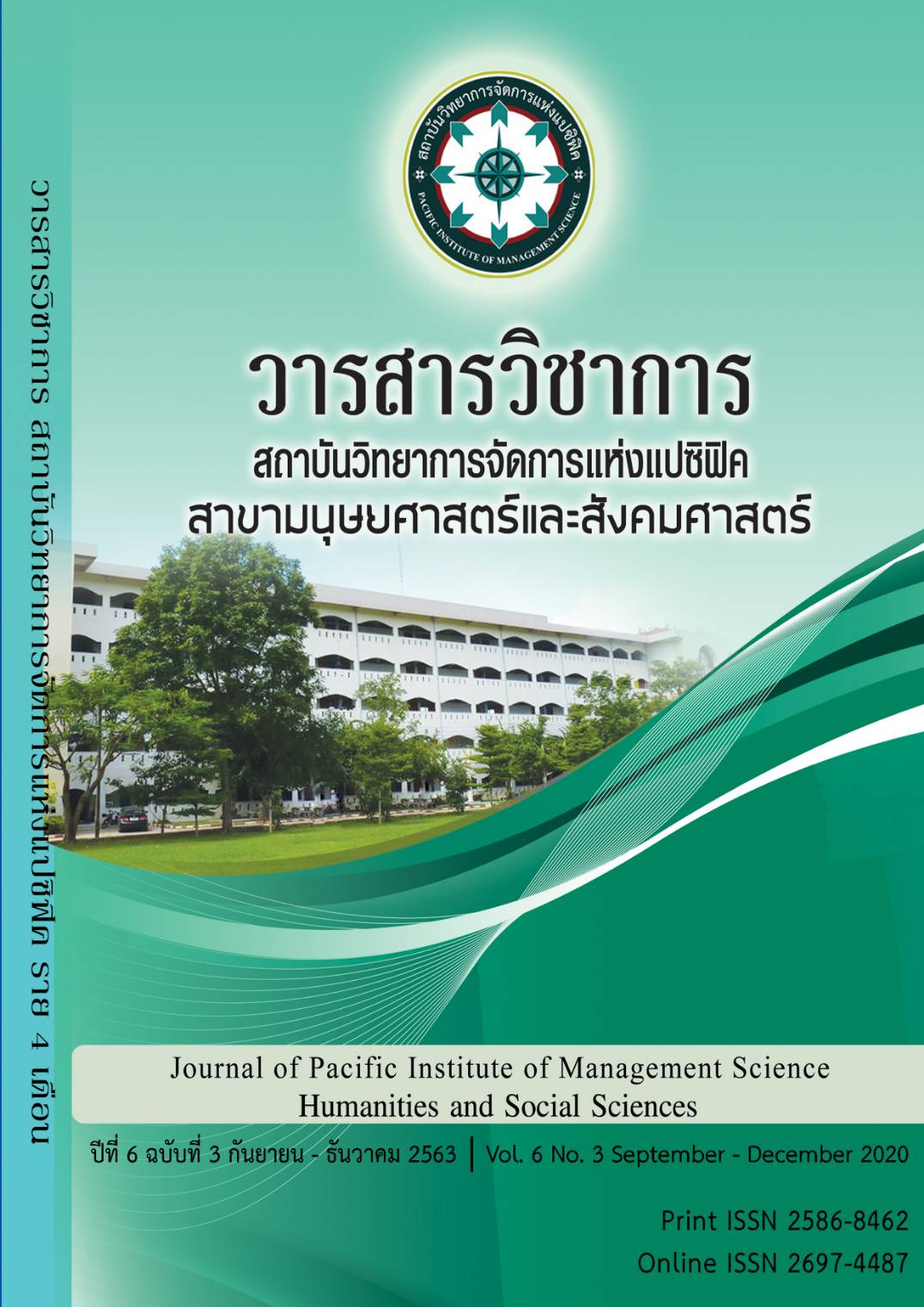Factors Affecting the Purchase of Sanitary Ware at Modern Retail Stores in Muang District, Chiang Rai Province
Keywords:
Factors Affecting the Purchase, Sanitary Ware, Modern Retail Stores, ConsumersAbstract
The objectives of this research were to investigate the following: 1) factors affecting the purchase of sanitary ware; 2) problems encountered in the purchase of sanitary ware and the solutions to problems of entrepreneurs in Muang District, Chiang Rai Province. The samples used for the research were the customers purchasing sanitary ware in this research area, selected by using a purposive sampling method of 400 people. The research found that, according to the socio-economic factors in consumer purchasing of sanitary ware, customers were not members of the modern sanitary ware retail store; with stay informed from brochures, word of mouth, television, radio, and newspapers; on the purchasing decisions were by themselves, followed by neighbors, lover/spouse, and relatives. While the attitude overall factor was at the high level, as well as considering each factor were at the high level which the location, convenience and speed, service, salesman, and product quantity respectively. Moreover, in the factors for choosing sanitary ware in modern retail stores found that the customers chose to go to the store which has been to regularly; the frequency of purchasing sanitary ware depending on the occasion; the types of sanitary ware to choosing were toilet flushing, soap holder, and basin respectively; the quantity in the purchase according to the needs to be used each time; a well-known brand was selected. In addition, the overall problems encountered in the purchase of sanitary ware were at medium level, with bearing in mind each factor, promotion, distribution channels, product, and price, were at medium level.
References
กุณฑลี เวชสาร.(2545). การวิจัยการตลาด. กรุงเทพฯ: โรงพิมพ์แห่งจุฬาลงกรณ์มหาวิทยาลัย.
ฉัตยาพร เสมอใจ และ มัทนียา สมมิ. (2545). พฤติกรรมผู้บริโภค. กรุงเทพฯ : เอ็กซเปอรเนท.
ฉัตรชัย ประเสริฐธนารัตน์. (2556). พฤติกรรมการเลือกวัสดุอุปกรณ์การก่อสร้างในอำเภอเมืองจังหวัดเชียงใหม่. การค้นคว้าอิสระบริหารธุรกิจมหาบัณฑิต (การตลาด).เชียงใหม่ : บัณฑิตวิทยาลัย มหาวิทยาลัยเชียงใหม่.
ธนวัฒน์ ทัพชัย. (2559). ปัจจัยส่วนผสมทางการตลาดที่มีผลความสัมพันธ์กับพฤติกรรมการซื้อเครื่องสุขภัณฑ์ของผู้บริโภคในจังหวัดปทุมธานี. การค้นคว้าอิสระ.หลักสูตรบริหารธุรกิจมหาบัณฑิต วิชาเอกการตลาด คณะบริหารธุรกิจ. ปทุมธานี: มหาวิทยาลัยเทคโนโลยีราชมงคลธัญบุรี.
นนตพันธ์ เทียนทอง. ( 2555). ปัจจัยทางการตลาดที่ผู้บริโภคใช้ประกอบการพิจารณาใน การเลือกซื้อสุขภัณฑ์ของผู้บริโภคในกรุงเทพมหานคร. การค้นคว้าอิสระ. หลักสูตรบริหารธุรกิจมหาบัณฑิต. กรุงเทพฯ: มหาวิทยาลัยหอการค้าไทย.
รัชชเดช อยู่ผาสุก. (2553). ปัจจัยที่มีผลต่อการซื้อเครื่องสุขภัณฑ์ในร้านค้าปลีกสมัยใหม่ในเขตอำเภอเมือง จังหวัดเชียงใหม่. วิทยานิพนธ์บริหารธุรกิจมหาบัณฑิต. เชียงใหม่: มหาวิทยาลัยแม่โจ้.
ศุภร เสรีรัตน์. (2544). พฤติกรรมผู้บริโภค ฉบับสมบูรณ์. กรุงเทพ: บริษัท วิสิทธิ์พัฒนา จำกัด
ศูนย์วิจัยกสิกรไทย. [ระบบออนไลน์]. แหล่งที่มา: https://www.kasikornbank.com/th/business/sme/KSMEKnowledge/article/KSMEAnalysis/Documents/ConstructionMaterialStrategy.pdf. สืบค้นเมื่อ 15 สิงหาคม 2562.
ส่องเทรนด์ตลาดธุรกิจค้าปลีกและค้าส่งวัสดุก่อสร้างเมืองไทย. [ระบบออนไลน์].
แหล่งที่มา: https://www.marketingoops.com/news/biz-news/dohome. สืบค้นเมื่อ 15 สิงหาคม 2562.
สุพจน์ กาญจนางกูรพันธุ์. (2557). ปัจจัยที่มีผลต่อพฤติกรรมการตัดสินใจซื้อวัสดุก่อสร้างในช่องทางการจำหน่ายแนวใหม่ในเขตกรุงเทพมหานครและปริมณฑล. การค้นคว้าอิสระ. ลำปาง: มหาวิทยาลัย เนชั่น.
ศิริวรรณ เสรีรัตน์และคณะ. (2546 ). การบริหารการตลาด. กรุงเทพมหานคร : บริษัท ธรรมสาร จำกัด.
อนุชิต ศิริกิจ. (2550). “อิทธิพลของคุณลักษณะและภาพลักษณ์ตราผลิตภัณฑ์ที่มีผลต่อมูลค่าทุนตราผลิต ภัณฑ์ของวิสาหกิจขนาดกลางและขนาดย่อม.” วารสารพาณิชยศาสตร์บูรพาปริทัศน์ 3, 1 (ตุลาคม): 92-112.
Downloads
Published
Issue
Section
License
บทความที่ได้รับการตีพิมพ์เป็นลิขสิทธิ์ของ สถาบันวิทยาการจัดการแห่งแปซิฟิค
ข้อความที่ปรากฏในบทความแต่ละเรื่องในวารสารวิชาการเล่มนี้เป็นความคิดเห็นส่วนตัวของผู้เขียนแต่ละท่านไม่เกี่ยวข้องกับสถาบันวิทยาการจัดการแห่งแปซิฟิค และคณาจารย์ท่านอื่นๆในสถาบันฯ แต่อย่างใด ความรับผิดชอบองค์ประกอบทั้งหมดของบทความแต่ละเรื่องเป็นของผู้เขียนแต่ละท่าน หากมีความผิดพลาดใดๆ ผู้เขียนแต่ละท่านจะรับผิดชอบบทความของตนเองแต่ผู้เดียว







